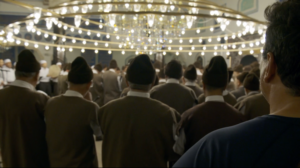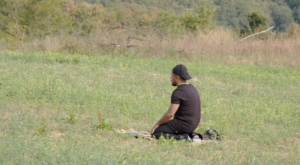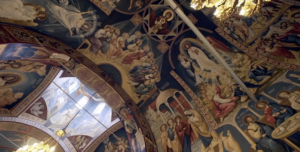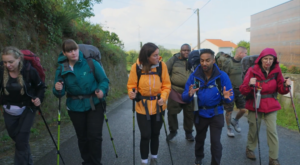This clip comes from the BBC series: Pilgrimage – The Road to Istanbul.
Edwina, Amar, and Pauline embark on a solemn visit to the remains of the Crveni Krst concentration camp in Serbia – a memorial to humankind’s continued inhumanity. This site bears witness to the unfathomable cruelty endured by 30,000 individuals of Jewish, Serbian, and Romani descent at the hands of German forces during World War II. They see the bullet holes still in the walls where people were executed, and discover chilling facts about the camp’s history,
Edwina – who is Jewish – reflects on her upbringing in a post-war world marred by profound trauma. Pauline talks about the importance of acknowledging what happened at the concentration camp instead of just moving on.
Edwina concludes with the thought that places like the Crveni Krst camp are a challenge to faith. How could God let it happen?
Watch full episodes on BBC iPlayer.
Transcript
Pilgrimage Moments: The Bullet Holes
Narrator: Across the city, Edwina has brought Ahmer and Pauline to a monument to more modern conflict, a site that stands as a memorial to man's continued inhumanity. The Seveni Krust concentration camp.
Edwina: Oh, I can see the swastika. Jesus. Excuse me. We are standing in front of one of the smaller barracks. And over the door there is a swastika and Wache. And then. And ss. SS, isn't it? It is. So that's probably been the SS office.
Edwina: Mhm.
Edwina: But it looks like they got us a little gift shop.
Narrator: During the Second World War, a total of 30,000 people of Jewish, Romani and Serbian origin were held within this camp by German forces.
Amar: So is this where people were executed? Yes.
Pauline: It's incredibly humbling and devastating. It's extraordinary to see the marks where the bullets hit there that had gone through a person and executed it.
Amar: So you can see bullet marks.
Pauline: Do you want to come down and touch it?
Edwina: Yeah. You go down.
Pauline: Yeah. You you you you stay here. Yeah. I know it's upsetting you. So that's bullet. Bullet holes.
Amar: Oh, wow. In there.
Pauline: Yeah.
Amar: If they can make a hole in the wall.
Pauline: You know.
Amar: Like how big they are.
Pauline: Could you have you.
Edwina: The world in which I grew up was one that was badly traumatized by the Second World War. Wherever you looked, there were bomb sites and three legged dogs. But also the Jewish community, of course, had lost so many people. Lots of things people didn't talk about. Lots of pain. It wasn't until much later that we realized what they had all been through.
Narrator: In 1942. 105 prisoners escaped from this camp. The first time an escape had been successful in mainland Europe. The response from the German army was brutal.
Pauline: The Nazis implemented a policy of killing 100 Serbian hostages for every German soldier killed, and killing 50 for every soldier wounded in Serbia. They executed over 10,000 people on nearby Banja hill.
Amar: Can you see people's pictures here?
Pauline: Oh, yes.
Edwina: Yes. Let me describe. There's an old man in a fez with a bristling moustache. Maybe he's an old soldier. There's a handsome man in a smart suit and a moustache. What's striking is the different ages of people. And young.
Pauline: Old people.
Amar: Wow.
Edwina: When the 10,000 were shot, they were shot very publicly because that was a warning. You try this again. This is what will happen. Not just that you'll die, but you will cause the death of others. What was it? A hundred times as many.
Pauline: Yeah, yeah. We're going to visit lots of places of worship on this pilgrimage, but it seems to me that places like this concentration camp should also be mandatory for anyone who is is making that kind of journey. Because this too is testament to what we must also acknowledge. It's not always just let's say hallelujah and move on. You got to mark it.
Edwina: A place like this is a challenge to faith because if God exists and God is good, how could God let something like this happen? That's not the way I see it. So the way I see it is that we all have to take responsibility for our actions. There was a lot of bravery here, a lot of courage here. But in the end, it's a place of brutality and destruction. It's very, very sad. Do you know what? If I'd been in charge, I'd have burned the whole place to the ground. And I would have built a garden.








